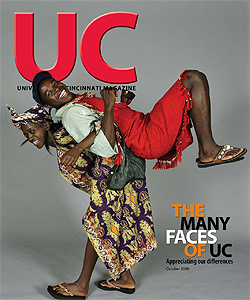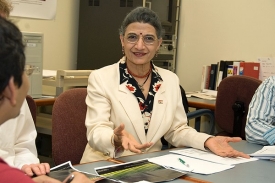India native's career sets example for aspiring female scientists
by Amanda Chalifoux
Urmila Ghia's journey to becoming an engineer started with $8.
That was the amount of money in her pocket in 1964 when she arrived in Chicago from India. She was beginning classes soon as a graduate student at the Illinois Institute of Technology and was waiting on funds to pay tuition and other expenses.
Urmila had to make a decision. She couldn't phone home with the money because it cost about $3 a minute to make a call. "So I had to choose between buying a little food and buying a stamp," she recalls.
By then, Urmila was accustomed to making tough decisions. She had already chosen to pursue a male-dominated science field in a foreign country during a time when most women, both in India and elsewhere, were discouraged from having careers of their own. When she applied to study engineering as an undergraduate in Bombay, the director of the college informed her that there were only 150 open slots for students in the program. He said that if he admitted her, she would deprive a male student of a chance to support a family.
"He told me that I would not pursue a career and that he'd be wasting a seat on me," Ghia says. "I said, 'No, I'm going to pursue it.' I'm glad I didn't pay attention to those negative things at the time."
Paving her own way through hard work was nothing new for Urmila. Growing up in northern India, her parents stressed the importance of education to Urmila and her brother and sister, even forbidding them from doing household chores to focus solely on their studies. Her mother home-schooled her until she was 5, when she insisted that Urmila be placed in second grade. Hesitatingly, the school agreed, with the understanding that if she couldn't keep up, she would be held back. "But my mother was not going to let that happen. She worked with me so that I succeeded."
When her mother later insisted that 7-year-old Urmila skip the fourth grade, the school asked if the little girl could do fractions, a common skill for that grade level. She couldn't, but her mother said yes. "Then she took me home and taught me fractions," Ghia laughs. Her mother's efforts paid off -- Urmila never attended the fourth grade, going straight to fifth instead.
After the family moved to Bombay, the emphasis on education continued. Urmila struggled to learn English; up until then, she only knew Hindi. Her parents expected their children to choose one of the professions considered most respectable in India -- a physician, engineer or lawyer. She thought about medicine, but didn't want to be an ob-gyn, then the only acceptable route for women.
"And I did not want to do the traditional thing," she says. "I wanted to go into something that women didn't normally go into so that I would have something unique to offer, something to call my own. I wanted to stand out."
Urmila knew the best engineering education at the time could be found in Germany and the U.S. Having visited her older brother in Germany, where he was studying engineering as well, Urmila decided on the States instead. At graduate school in Chicago, she was one of just a few female engineering students. While there, she met her husband, Kirti Ghia, who was also from Bombay.
After finishing her degree, she came to Cincinnati to join Kirti, who is on faculty in aerospace engineering, and began a nearly 40-year teaching and research career in UC's engineering program.
These days, she shares her own early determination and experience to help female students see professional opportunities in places that seemed unlikely a generation ago. In the late '90s, Ghia helped start the Women in Science and Engineering, or WISE, program, which places women undergraduates in stipend research positions with UC faculty. The program has grown from just eight students the first summer to 24 this year. Ghia works closely with the students throughout the 12-week program, so much so that they often become like family, staying in touch with news of jobs, graduate school, marriage and children.
Ghia says she is proud when students give their presentations at the end of the program and reach the goal she had set for them -- that they graduate with their degree from UC. "You have to work hard, no matter what field you're in, and in order to work hard, you have to feel enthusiastic," she says. "If a woman feels enthusiastic about science and engineering, that's great. They bring a different perspective to situations sometimes, and that can lead to greater creativity."
The professional and personal relationships built through the years are most rewarding for Ghia, a value she inherited from a sociable, warm mother, and one she has tried to instill in her own two daughters. "In the bigger scheme of things, what you did today is one thing, but relationships are what you take with you."
For Ghia, those connections have not only seen her through her own journey, but led her to help young students on theirs, too.
"I believe in the human potential. Everyone has something to offer, and there should be no barriers to students' success if they don't see barriers themselves."
Urmila Ghia is a professor of mechanical engineering at UC and director of the CFD (computational fluid dynamics) Research Lab. She received the 2007 Barbour Award for Good Faculty-Student Relations and the 2004 George Rieveschl Jr. Award for Distinguished Scientific Research. Her husband, Kirti, is a previous recipient of both awards and also of the 2004 Cohen Award for Excellence in Teaching. Their eldest daughter, Tina, is a cardiologist, and younger daughter Kiran works as an attorney, currently representing detainees at Guantanamo Bay, Cuba.

 Issue Archive
Issue Archive